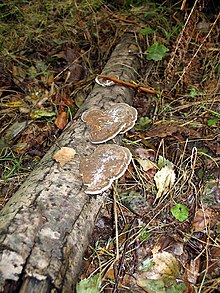Decomposers are organisms that break down organic matter and release the nutrients into the environment around them. Decomposition is a chemical process similar to digestion, and many sources use the words digestion and decomposition interchangeably.[1] In both processes, complex molecules are chemically broken down by enzymes into simpler, smaller ones. The term "digestion," however, is most commonly used to refer to food breakdown that occurs within animal bodies, and results in the absorption of nutrients from the gut into the animal's bloodstream.[2] Decomposition happens outside of an organism's body, in the environment. Decomposition is also referred to as external digestion; the decomposer works not by swallowing the dead tissue and then digesting it, but by releasing enzymes directly onto it.[3] After allowing the enzymes time to digest the material, the decomposer then absorbs the nutrients released by the chemical reaction into its cells.

The ability to perform external digestion is only possessed by certain groups of organisms, such as bacteria and fungi.[4] Like herbivores and predators, decomposers are heterotrophic, meaning that they must consume organic matter in the form of other organisms to get carbon and nutrients for growth and development. While the terms decomposer and detritivore are often used interchangeably, detritivores digest dead matter internally using enzymes in their guts, while decomposers release digestive enzymes onto the dead material and then absorb the nutrients directly through their bodies' surfaces.[5][6] Thus, invertebrates such as earthworms, woodlice, and sea cucumbers are technically detritivores, not decomposers, since they must ingest their food before digesting it internally and then absorbing through the wall of the gut.[7]
- ^ Clark, Mary Ann; Douglas, Matthew; Choi, Jung (2018-03-28). "6.1 Energy and Metabolism - Biology 2e | OpenStax". openstax.org. Retrieved 2024-10-30.
- ^ Patricia, Justin J.; Dhamoon, Amit S. (2024), "Physiology, Digestion", StatPearls, Treasure Island (FL): StatPearls Publishing, PMID 31334962, retrieved 2024-10-30
- ^ "31.2: Fungal Forms, Nutrition, and Reproduction". Biology LibreTexts. 2021-12-05. Retrieved 2024-10-30.
- ^ "NOAA. ACE Basin National Estuarine Research Reserve: Decomposers". Archived from the original on 2014-10-09. Retrieved 2012-09-17.
- ^ Griffiths, Hannah M.; Ashton, Louise A.; Parr, Catherine L.; Eggleton, Paul (September 2021). "The impact of invertebrate decomposers on plants and soil". New Phytologist. 231 (6): 2142–2149. doi:10.1111/nph.17553. hdl:10072/406155. ISSN 0028-646X.
- ^ Trophic level. Eds. M. McGinley & C. J. Cleveland. Encyclopedia of Earth. National Council for Science and the Environment. Washington DC
- ^ "Decomposers". citadel.sjfc.edu. Archived from the original on 2019-06-26. Retrieved 2019-05-09.